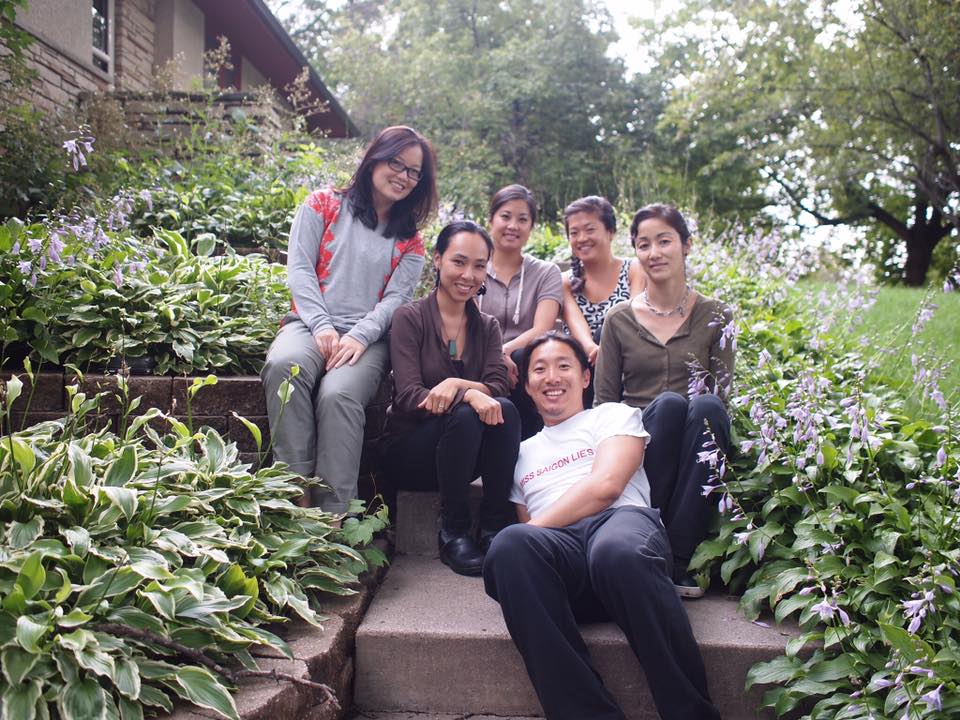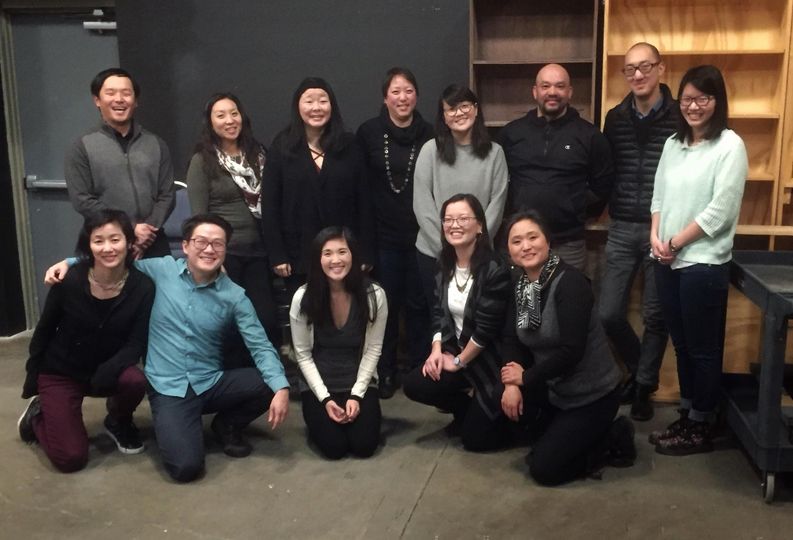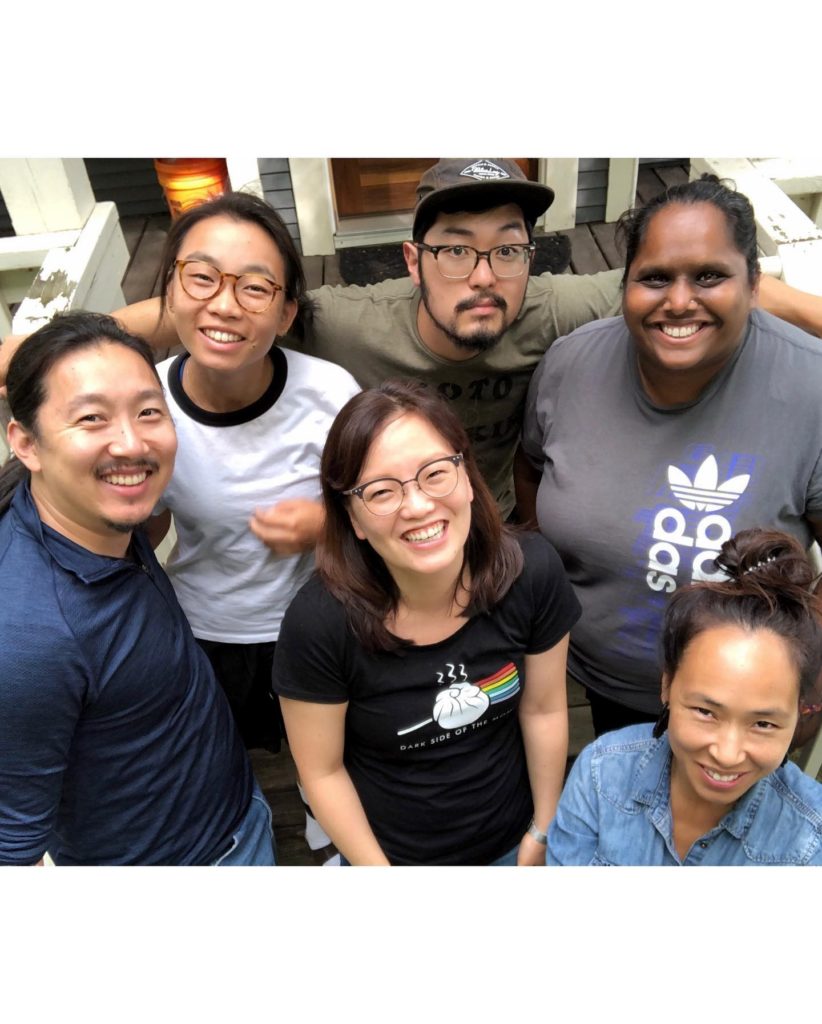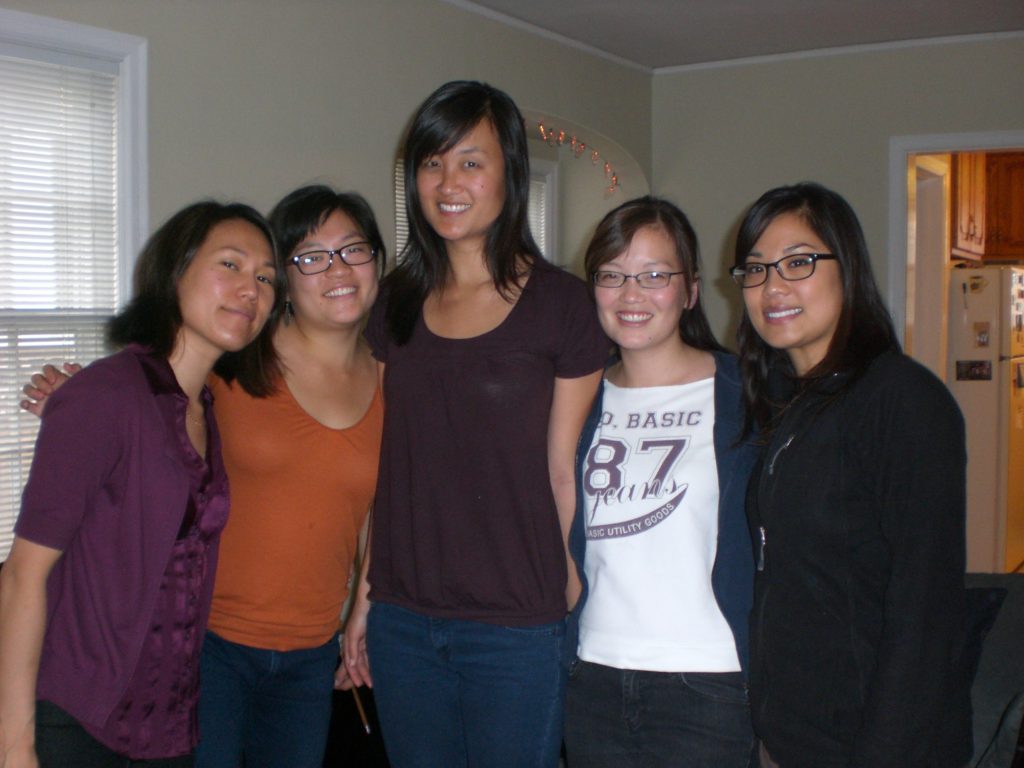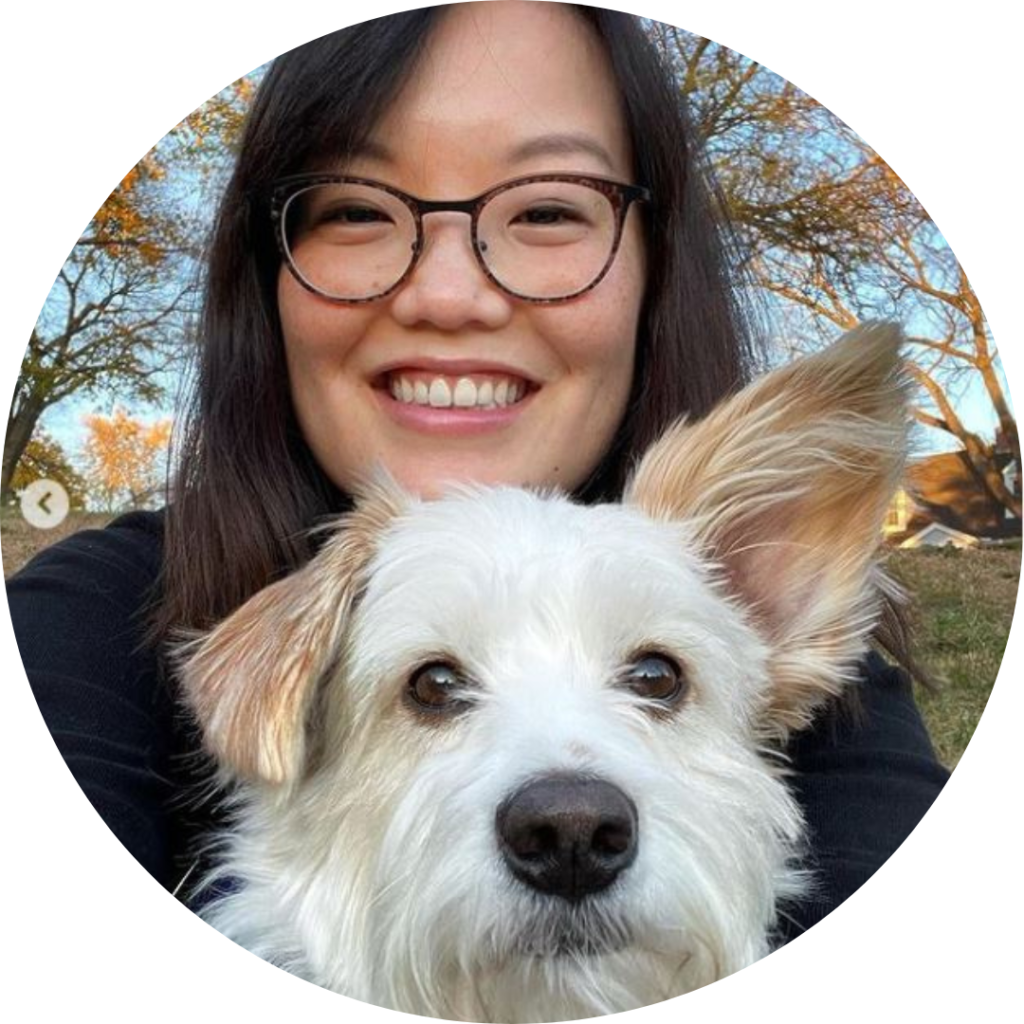Uplifting rich and diverse stories from our Asian Minnesotan community.
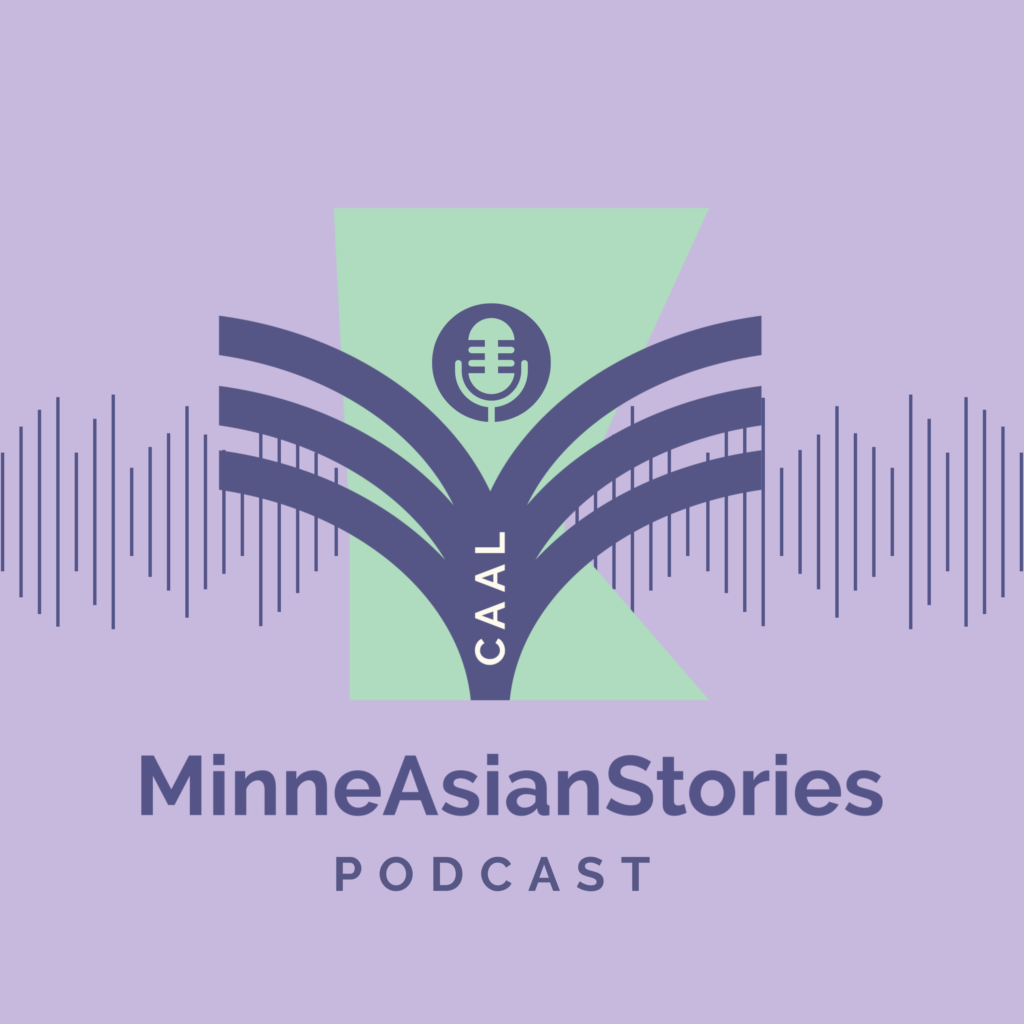
Episode 2.9 “Adoptee liberation is also connected to our shared liberation”
Margie reflects on her work with the Network of Politicized Adoptees (NPA), an all-volunteer group of transracial adoptees working at the intersection of social justice and adoptee rights. Listen in on how Margie found her way to adoptee justice organizing and connects her work to the broader movement for shared liberation.
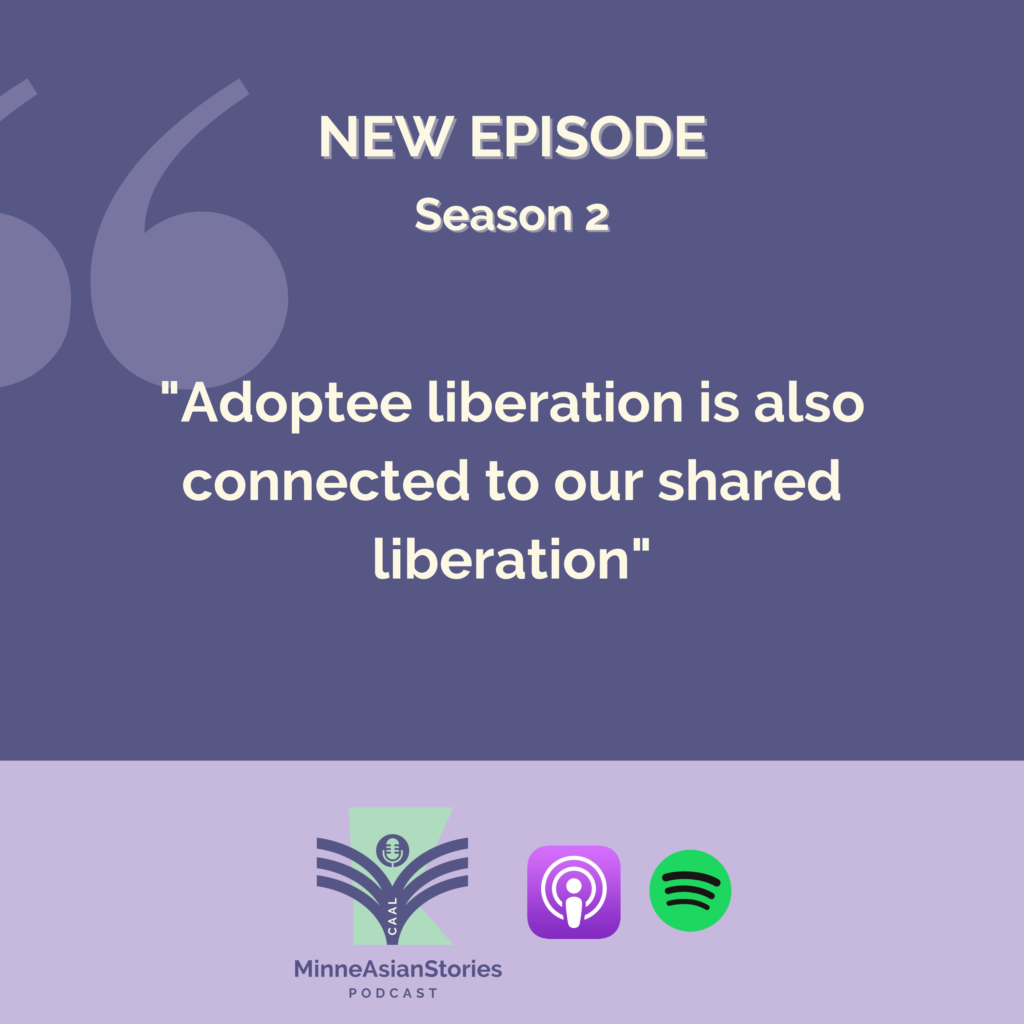
Archival Photo
Images from past Network of Politicized Adoptees steering committee gatherings.
1) 2011 NPA steering committee meeting 2) 2017 NPA steering committee retreat photo 3) 2018 NPA 1st cohort of our community class 4) 2019 NPA steering committee retreat 5) 2022 NPA steering committee post Al Jazeera interview
Episode Transcript
Margie: Adoptee organizing isn’t just campaigns. When we pause and reflect and deconstruct also as adoptees the internalized messages that we’ve grown up with, that we still have, I think that this is also adoptee organizing when we can take the time to heal ourselves and also provide spaces for other adoptees to heal and connect and do adoptee organizing in that way as well.
[Narration]
Julia Gay: This is Julia Gay, your host of the MinneAsianStories Podcast, bringing you rich and diverse stories from our Asian Minnesotan communities. This season, we’re talking with organizers and leaders in our community to uncover stories and lessons from Asian Minnesotan movement history, and explore how these historical fights have helped pave the way for the work that we are doing today. Believe it or not, this is our final episode of Season 2. Last year around this time, I remember chatting with some friends and colleagues about how cool it would be to create a podcast that centered Asian Minnesotan stories and voices. And just a year later, here we are wrapping up Season 2. I’m so incredibly grateful to our podcast production team for making our dream a reality, to our incredible guests this season for sharing your wisdom and stories with us, and of course, to you, our listeners for joining us on this journey.
If you’re enjoying these episodes, please leave us a rating and review on your favorite podcast platform and make sure to tell your friends. We hope this podcast can serve as a resource to our community members and educators as an archive of just some of the incredible contributions of Asian Minnesotans to local and national justice movements. If I’ve learned anything from this season, it’s that Asian Minnesotans are here. We are organizing for a more just and joyful world. And we have been for decades.
This week on the MinneAsianStories Podcast, we continue our look at adoptee justice organizing and how transracial and transnational adoptees in Minnesota are creating adoptee centered spaces for processing, healing, and joy. It’s my pleasure to introduce this week’s guest Margie Jo Eun Joo Andreason. Margie is part of the larger Korean diaspora and has 15 plus years of experience working with nonprofits, foundations, and leading community organizing efforts, including the Don’t Buy Miss Saigon Coalition and Pan-Asian Voices for Equity-Minnesota.
Margie is also a longtime CAAL network leader. She joined the Coalition of Asian American Leaders back in 2013 as a founding board member and served as a board chair from 2018 to 2020. She wears many hats, but for this episode, I invited her to come on this podcast to share more about the history and work of the network of politicized adoptees in all volunteer group of transracial adoptees, working at the intersection of social justice and adoptee rights. Margie is a close friend of mine and a co-founder of NPA. Together we serve on the NPA steering committee. I hope you enjoy our conversation reflecting on how adoptee justice is deeply rooted in the wider movement towards shared liberation.
[Interview]
Margie: I’m Margie Jo Eun Joo Andreason. My pronouns are she and her. I currently live in the Twin Cities, located on original lands of the Dakota and Anishinaabe people who are still here today. Other than a short teaching gig in Korea and going to undergrad in Moorhead, Minnesota, I grew up and have lived in the Twin Cities since I was sent to the United States as a toddler. My connection to CAAL, the Coalition of Asian American Leaders is that I’m a founding board member of CAAL and had the honor of being a board chair from 2018 to 2020. I’m also a Korean adoptee and a co-founder of Network of Politicized Adoptees, a group I deeply care about. And fun fact, this is my first podcast interview ever. So super excited to be here with you.
Julia Gay: Wow, this is great. I’m glad that we got to be your first ever podcast interview. I’m sure of a career or future of many podcast interviews to come. So could you start off just by sharing a little bit about how you got into specifically adoptee organizing?
Margie: I got into adoptee organizing by first organizing in the broader Asian Minnesotan community. So in my 20s, early 30s, I learned about community organizing before I knew it was called that by just showing up to community meetings, being willing to jump in when someone needed something. I was part of different media justice, police brutality campaigns with groups like Community Action Against Racism, CAAR, Justice for Fong Lee, Pan-Asian Voices for Equity-Minnesota, PAVE, and the Don’t Buy Miss Saigon Coalition. So really meaningful work, but nothing explicitly focused on the adoptee community, which I’ve considered my kind of inner circle of my own identity. I think the more racial justice campaigns that I did, the more skills that I built around deepening my own analysis around power. And having the chance to really build strong relationships across the Asian Minnesota community and with other communities of color, I really started to think about this really important lesson in community organizing, which is that those most impacted should be at the center of any community organizing work.
And as I was really doing the self reflection, that led me to really consider intentionally doing adoptee organizing work. But the problem is that I felt like quite an odd ball in the transracial adoptee community for a long time. I’d go to these adoptee events, these socials and folks would be reinforcing the idea that adoptees shouldn’t be activists, that we should just be grateful that we’re adopted. And this mainstream narrative made me really uncomfortable. It made me think that maybe I didn’t really belong in the adoptee community until I did find other Korean adoptees that brought more of a social justice lens, a critical lens to adoption systems. And when I found this group of people who really wanted to complicate the dominant narrative around adoption, I found my people. This was the group of transracial adoptees that I helped to co-found Network of Politicized Adoptees with.
Julia Gay: For listeners, I reached out to Margie knowing that she wears so many hats in the community as an organizer and leader and all around lovely person. I had to clarify, I was like, I know you have done so much, but I’d love to hear specifically about your work with the adoptee community. We have worked together in the Network of Politicized Adoptees as steering committee members. So I’m really happy to be able to bring her on to this podcast to have her share a little bit more about the work that we get to do. So with that, Margie, could you share a little bit more about the Network of Politicized Adoptees for our listeners?
Margie: I would add that it’s really important that I also lifted up other broader organizing that I’ve done because I really have been shaped by that and it really has really led me to do the work within the adoptee community and organizing. So I’m super excited to talk more about Network of Politicized Adoptees. We work at the intersection of adoptee rights and social justice. We were founded over a decade ago in 2011. Our history as a group is that we actually started as a study group. We were talking just amongst ourselves about how in school we’d never learned about the Korean war, anything about the adoptee history. And we decided that we were going to read some books, read some articles and start discussing that with each other. So reclaiming our own history is actually how NPA started. And we’d sit around in a circle or around a table in each other’s homes. There’s-
[00:09:04] Margie: In a circle or around a table in each other’s homes. There’s always good food, always, and as we learn more about our history and about relationships with each other, it really caused us to want to do something with that knowledge. So we’ve always been and continue to be an all volunteer grassroots group, but our mission is really to strengthen, cultivate, and improve the lives of adoptees by building community power, and that through solution focused action, we’d advance adoptee justice by telling our own stories and collectively working towards systemic change within adoption. We focus a lot on community building, making adoptees visible, shifting narratives to center adoptees. Just to highlight some of that work right now, we’ve organized a community course on adoption history and culture using films and scholarly articles and working with Dr. Kim Park Nelson to lead this class.
For me, the significance really ties back to the history of NPA, and building adoptee leaders, and we’re creating a container for folks to become more politicized, steep in our own analysis, while also making deeper connections with each other. It’s not just learning for learning sake, but it’s about understanding how we’re situated in bigger systems and knowing where and when we can take action together and having that space to practice and unpack adoptee history with each other. I believe this makes us stronger in adding our voices to the broader community.
Julia Gay: I am so grateful for that course and I think that work that NPA is doing and in making space for us to learn about our own histories is incredibly significant, especially when we don’t always get to learn that at schools, in our schools or in our curriculum. Part of this podcast and the hope of this podcast is that we can start to unpack some of the rich history that we often is overlooked in our books, history books, and to start celebrating the work that’s happening right now and has been going on for decades.
Margie: Exactly.
Julia Gay: So can you share why NPA is significant, specifically to the wider Asian American community?
Margie: NPA is significant because we’re fostering Asian adoptees to be more engaged in social justice movements. Because adoptees are a significant part of the Asian Minnesota community, especially in this state, there are approximately 80,000 Asian adoptees in the state of Minnesota, and we should definitely be a part of any conversation about the Asian American community at large. I believe that adoptees really help broaden what it means to be Asian Minnesotan, Asian American, and that transracial transnational adoptees are Asian American, whether or not we’re accepted by broader community members, but that there’s space in Asian American identity to hold all of our differences and our nuances and that adoptees really help flush out what it means to be Asian Minnesotan in particular.
Julia Gay: Yeah, and back to your point about recognizing the significance of your past organizing work beyond the adoptee community, I think that that is really significant and that adoptees offer a very unique perspective to the organizing that’s happening beyond our insular community of transracial transnational adoptees. It’s important that when we’re organizing, we include all of these voices and perspectives.
I’d love to hear also for you personally what it’s meant to be a part of this group of adoptees.
Margie: Yeah, for me, organizing with NPA is deeply personal and it helps support my own wellbeing, my own sense of belonging, and my own healing journey. It’s a way for me to channel actually a lot of my angst into something really positive. I think I’ve had this mindset for a while where I really try to turn trauma, anger, disappointment, loss into energy to do something about it. CAAL has also helped cultivate this wiring my brain to take really difficult isolating experiences and turn it into something healing, something connecting, to not really stay and wallow in our pain. I think it’s important to acknowledge it and feel it. But what I love to do is actually do something meaningful with others. I feel that it’s a chance to be more powerful together, and it’s a way to really make something positive come out from that trauma, that pain. Really, organizing with NPAs an ability, it’s a way for me to do that with my own community.
Julia Gay: Can you reflect a little bit on the landscape of the adoptee community and how it’s evolved over time in Minnesota?
Margie: I think the first thing to chat about is the demographic changes. The first wave of Korean and then Vietnamese adoptees due to war and then a lot of shifts in demographics in the adoptee community here includes a lot more adoptees from China, India, all over South America, Ethiopia, so many different countries, sending countries here in Minnesota. NPA used to actually just be Korean adoptees and just a few years ago our steering committee looked around and realized there’s really no groups or resources for these newer transracial, transnational adoptees, especially ones that were adoptee led. When we viewed our own work from a social justice lens, we could clearly see the many similarities of our experiences and we knew that by expanding NPA and who was a part of our work and our leadership beyond Korean adoptees, we’d actually really be leaning in to the different nuances also of our experiences.
We made the shift. We made the shift to actually go beyond Korean adoptees as an organization and our steering committee now includes adoptees from China, India, and a lot of our events are actually broader even yet, including for those that identify as BIPOC adoptees. This is a huge shift, I feel like, in the landscape of the adoptee community and I would say that another shift is really seeing how adoptee rights intersect with other movements and different communities.
For instance, disability justice. At NPA, we’ve done actually a lot of learning in the last couple years to make our work more accessible to our deaf and hard of hearing community. This is just one way we’ve been able to really think about accessibility and inclusion and recognizing that adoptee justice and disability justice are deeply intertwined with each other and being able to offer ASL, for instance, at our public events is just one piece of that commitment. Me, actually requesting to you, to create a transcript of this podcast is really coming from the learning I’ve done in the last few years about how to make our work more intersectional and how to really include and expand who the adoptee community we’re trying to reach as part of our work. I think we’re better and stronger for it. It’s been a huge learning opportunity for those of us at NPA, and as the example of just how we’re really trying to connect with other movements and really deepen our own kind of thinking around the intersectionalities of all of our lived experiences.
I really see this shift, too, in expanding, there’s, I think, this theme of abundance and expanding, I think that I’m seeing, and what I also see is the expansion with organizing outside of the adoptee community, so connecting our issues with the broader Asian American community on things like immigration, deportation, I’m specifically thinking of the Adoptee Citizenship Act and the group Adoptees for Justice, really inviting in and welcoming kind of across the Asian American community how to be a part of this, knowing that we are a part of a larger, also bigger, struggle around immigration reform.
Also bigger struggle around immigration reform. And there’s just so many ways to look at adoption as any other system, which is deeply impacted by racism, misogyny, imperialism, colonialism, white supremacy, just name it. And when we can see these layers and our issues connecting, I think it really provides the opening for us to bring others in on these issues and for adoptees ourselves to also get involved in these other movements that intersect with ours.
Julia Gay: Thank you for that. And shout out to Margie for saying that she was only going to do this podcast if we were able to provide a transcript. And I really, really appreciate, and I know folks at Cal also really appreciate the commitment to accessibility in all of the work that you do, Margie, and also that NPA does. We will continue to work on making our work accessible to folks. It’s a good reminder that there are so many fats facets of our community that we’re serving. We are so intersected.
Margie: I think that’s really important. And I would add that I also think that adoptee organizing isn’t just one off campaigns or these specific experiences in that are unique to the adoptee community in terms of organizing around birth search or access to records. I think it’s bigger than that. Adoptee organizing is also about lifting up the many stories and nuances in our community and making them visible, because it really provides complexity to what it means to be adoptee. I actually also consider that adoptee organizing, that complicating what it means to be Asian American, complicating what it means to be an adoptee. This is narrative work. It’s about talking with our families, our friends, fellow commute organizers, and that this is adoptee organizing because we’re disrupting dominant narratives.
Adoptee organizing, isn’t just campaigns and these one off things, but it’s about how we lift up the many stories and nuances in our community. Because it’s very important that we complicate what it means to be an adoptee, that we highlight the complexity of what it means to be Asian American, that this is the narrative work, and that it’s just as important if not more so to be doing adoptee organizing with our family, with our friends, with our community. Because this is a part of disrupting dominant narratives and that when we pause and reflect and deconstruct also as adoptees the internalized messages that we’ve grown up with that we still have, I think that this is also adoptee organizing when we can take the time to heal ourselves and also provide spaces for other adoptees to heal and connect and do adoptee organizing in that way as well.
Julia Gay: Popular question I get, when I share that I’m a part of the network of politicized adoptees is what is politicized? What does that mean? And I think it means a lot of things. And I start with the fact that, well, one being a transracial and a transnational adoptee is a politicized identity intrinsically, and just zooming out and looking at how I came to be here in the United States of America as a result of these larger systems that you named, of globalization, of white supremacy and white saviorism, of imperialism, of capitalism, then it’s yeah, we are our existence here in the United States on this indigenous native land is very politicized. I hold a personal responsibility to be pushing against this dominant narrative that tells me as an adoptee that I should be grateful, a grateful adoptee or that I’m lucky to be here
I love being a part of NPA because we do things like eat food together, or we go for walks together, or we play with Margie’s incredibly adorable dog Sammy together. And these acts you could say are not very political, but in fact, they are because we are finding community for ourselves and making community for ourselves. That in itself is healing, as you said, and it’s powerful. And to me, I’ve set this to the group, but there are no other Zoom meetings that I enjoy being a part of except for our biweekly steering committee meetings, because it just feels so affirming and so fun to reconnect with these folks. It feels exciting when we have programming. It feels exciting when we have a live campaign or we’re coordinating this class with Kim Park Nelson, but also feels really exciting when we just get to connect and find the community that we didn’t have growing up. So I think those are all really important points to make.
Margie: I can pinpoint exactly how I met the folks of NPA in our first meeting, actually. It was Dr. SooJin Pate was providing some introductory aspects of her research and it was about looking at Korean adoption through a militaristic gaze and understanding really the origins of Korean adoption. And she was sharing this fascinating research with other adoptees. It was an adoptee only space. And I went not really knowing what to expect, but when I got there, I was shocked that these were other adoptees that are having really similar or have been thinking about really a critical analysis of our history and really looking through the lens of social justice that really was eye opening and also felt so good to actually find others that were thinking about these things. And I remember we got so excited about hearing about SooJin’s research that I think we just organically after the event, we’re like, “Hey, who wants to continue having this conversation?”
You know, what was super important too, was think of other people you’d want to bring to this conversation. And I remember reaching out to CJ Key and other folks and being like, “Would you be interested in going to someone’s house that we’ve never been to before and continuing this conversation?” And we were actually in Dr. Jennifer Kwon Dobbs’ living room, pulled up really random chairs, and started just having a conversation and hanging out with each other. That really was the start of NPA, without knowing or calling it that for years to come.
That really is I think the thread of what makes NPA unique and special still to this day, that we really value that coming together, that community building, the relationship building, the ability to have those kinds of conversations with each other and taking the time to educate ourselves and share the wisdom and knowledge with each other. We have so many adoptee scholars, and researchers, and artists, and commute organizers that we can really learn from that have been doing work for a long time. And it’s really important that the research, art, everything, is also done by adoptees. I think you can really tell when it’s not, if there’s an adoptee story and it’s not actually influenced by adoptee, you don’t get that depth of experience, the nuances of what it really is like growing up in predominantly white Minnesota as a transracial adoptee. There’s a lot to unpack. And I think that adoptee. There’s a lot to unpack. And I think that lifting up those experiences and having stories by us be heard by other adoptees is really important for our work.
Julia Gay: Centering adoptees in the adoptee narrative. It seems so simple and yet it is so often forgotten and overlooked, our voices. Can you share a little bit of what you have learned, or how you have sustained yourself as an organizer and leader in the community for all of these years?
Margie: Laughter is healing. Actually having joy and finding joy and being in spaces together really helps sustain me as an organizer, as a leader, and I think helps sustain organizations like NPA, like CAL, it’s really important. I think the other thing that has been helpful for me has been to invest in my own healing journey. I’ve been seeing a body worker practitioner for a number of years. And part of that is really unlearning what white supremacy is telling us, which is to separate our bodies from our minds. And so I’ve been really paying attention to is how to actually pay attention to my body and like what’s going on.
Margie: And I think that’s super important and that healing journey actually individually helps our community collectively in many ways. It’s really important to step back as a leader and give others a chance to lead. It was the best decision ever to bring on new steering community members, even in the middle of a pandemic. It was the best decision because we’re supporting the next generation of leaders, bringing on new experiences, new voices into NP’s work has been able… It really has been able to transform our work and who is a part of all of the things that we do. And it’s really important for organizations to sustain, to be able to really be welcoming and inviting for folks who have the energy to get involved, to learn, to grow. I think it’s really important as a leader to model that for other leaders in the community.
Julia Gay: I love your point on laughter. I think laughter is so rich and healing and awesome. And the thing I love about the Network of Politicized Adoptees is like every steering committee member is hilarious. We’re all so funny. I don’t know. It’s just, we’re going back and forth in our meetings with funny quips and jokes and it is a great time. It’s a good reminder that I think often when we talk about adoptee organizing, it drops down to this like very serious tone and we do have trauma. Yes. And this system is very complex and there’s a lot of work to be done and we can also have fun and joy and laughter while doing this work. And so I like the reminder, every time we have a meeting that we’re just goofy beings that care a lot about each other in the community.
Margie: I agree. And we could spend all of our energy in just being angry at so many different things. But I think it is in some ways, understanding that like how we come together and how we do our work is more important than whatever we can produce, whatever events that we can plan that coming together and infusing that with joy and wellbeing and supporting each other and supporting each others in how we want to grow as leaders too is super important and really has impacted I think our work and is about living and aligning with our values of social justice is actually being able to do that. And Adrian Mary Brown’s work around joy and how to make organizing joyful have been really influenced by that.
And I think it’s 100% correct that in order to really expand our movements, expand our organizing and our community, we can do that by making our spaces joyful and making our work meaningful and to provide that space for others who could really use that, especially nowadays. I think it’s really important given the constant barrage of what we’re seeing on social media and to be able to just really protect that joy in our work is super important and it’s a way for us to actually be leaderful.
Julia Gay: So what’s your vision or hope for the future?
Margie: I want everyone to find community and find spaces that are affirming and people that you can be your whole self with and be vulnerable with. That’s what I have with Network of Politicized Adoptees. And I just want that for everyone. I can see how people change when they feel that community behind them that has their back and feel that support, especially when they haven’t had it growing up. So I want us to also, tying back to joy, I want us to live our lives too and have joy and also do the work that gives you purpose and contributes to making our community stronger, our social movement stronger because we’re actually a part of it. My hope for the rest of the Asian American community is to know adoptees are here. I want adoptees to be thought of when we talk about what it means to be Asian Minnesotan.
I think what we want is people’s desire to understand how our lives are connected, how adoptee liberation is also connected to our shared liberation. And that’s my hope for the broader Asian American community. And my hope for other adoptees who might be listening is that I want adoptees to get involved in all of these social justice movements. Know that you have belonging in broader Asian American organizing with groups like CAAL and that there’s organizing happening the adoptee community. And that my hope is when folks speak up, that they have a whole community right behind them. And that if adoptees are listening and are looking for us, we’re here and that they know that we’re here and that they can contribute and be a part of this growing I think movement to be more expansive in the adoptee community.
[Narration]
Julia Gay: Thank you so much to Margie for joining us on our podcast and sharing more about your work organizing in the adoptee community here in Minnesota. When Margie is not working or organizing, you can catch her taking great joy in food, Yelping about said food, playing tennis, and hiking in the parks year round with her partner, and Sammy, the cutest dog ever.
You can learn more about the Network of Politicized Adoptees at npa-mn.org. And you can find some incredible photos from past and recent gatherings with NPA at calmn.org/podcast. That’s calmn.org/podcast.
The Many Asian Stories Podcast is co-produced by the Coalition of Asian American Leaders, the Uptake, and WFNU Frogtown Community Radio.
A huge thank you to our fantastic production team. Katie Decelle, our editor. Hannah Kinser and Cerien Saadah our Many Asian Stories correspondents, Vin Lu for the theme music, and Kara Carmosino CAAL’s director of programs and my thought partner for the season. Once again, I’m your host, Julia Gay. And this is the Many Asian Stories Podcast.
